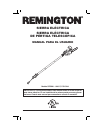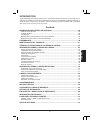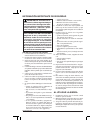
ENGLISH
19
www.desatech.com
CLEANING AND MAINTENANCE
1. Remove guide bar from chain saw.
2. Remove sawdust from guide bar groove peri
-
odically. Use putty knife or wire (see Figure
22).
3. Clean oil slots after each day of use.
4. Remove burrs from sides of guide bar. Use flat
file to make side edges square.
Replace guide bar when
• bar is bent or cracked
• inside groove of bar is badly worn
Note: When replacing guide bar, see Replacement
Parts and Accessories, page 21, for replacement
information. See Parts List, page 76, for correct
bar.
CLEANING SAW BODY
NOTICE: These are instructions for ser-
vicing your chain saw. Any servicing
not mentioned should be done by an
authorized service center.
WARNING: Unplug chain saw from
power source before servicing. Severe
injury or death could occur from electri-
cal shock or body contact with moving
chain.
WARNING: Cutting edges on chain
are sharp. Use protective gloves when
handling chain.
WARNING: When cleaning saw
body,
• do not submerge saw in any liq
-
uids
• do not use products that contain
ammonia, chlorine, or abrasives
• do not use chlorinated cleaning
solvents, carbon tetrachloride, kero-
sene, or gasoline
Keep saw body clean. Use a soft cloth dampened
with a mild soap and water mixture. Wipe saw
body to clean.
Figure 22 - Guide Bar Maintenance
Flat
File
Burr
Oil Slot
Cleaning Groove
With Putty Knife
Guide Bar
Figure 21 - Guide Bar Cross Section Showing
Uneven Bar Wear
Guide Bar With
Uneven Wear
Guide Bar
Normal Guide
Bar
Guide Bar Groove
CARE OF GUIDE BAR
Uneven bar wear causes most guide bar problems.
Incorrect sharpening of chain cutter and depth
gauge settings often cause this. When bar wears
unevenly, it widens guide bar groove (see Figure
21). This causes chain clatter and rivet popping.
Saw will not cut straight. Replace guide bar if
this occurs.
Inspect guide bar before sharpening chain. A
worn or damaged guide bar is unsafe. A worn or
damaged guide bar will damage chain. It will also
make cutting harder.
Normal Guide Bar Maintenance


















